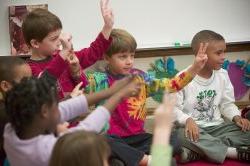什么是“儿童哲学”?
这本身就是一个重要的哲学问题, not easy to answer; but let us say that philosophy, 除此之外, 对令人困惑和有争议的概念的意义进行自觉的探究吗. 在古代,哲学被认为是对智慧或意义的探索, and many of the concepts philosophers have thought about for thousands of years are ones we use to structure our daily experience. “什么是正义?”?、“美是什么??、“我怎么能确定我所知道的??、“什么是该做的事??、“什么是真实的??”
哲学也以培养优秀的思维而闻名. 哲学最古老的分支之一是逻辑学, 其中包括非正式逻辑, 或者“批判性思维”.但哲学不仅仅是一种智力上的追求. Philosophers have tried 提高他们的思维能力 in order to better explore the philosophical dimensions of experience, 比如伦理道德, 政治和美学维度, 为了改善他们在这些方面的判断和行动. 哲学帮助我们学会认识, 例如, 我们经历中的伦理问题和可能性, 仔细思考, 做出合理的道德判断并采取适当的行动. 这就是为什么几千年来人们一直在实践哲学, 不仅在大学,而且在商业办公室, 读书俱乐部和咖啡馆.
哲学是最古老、最负盛名的学科之一, and until recently it was thought to be too difficult and uninteresting for children (and indeed, 对于许多成年人来说). 然而,, consider how many perennial philosophical issues are typically encountered by children as young as four or five:
- 我想知道鬼魂是真实的还是不真实的.
- 当爸爸告诉我要乖,他是什么意思?
- 怎样才能成为最好的朋友?
- 人们说爱我是什么意思?
- 这不公平!
- 为什么有时候时间过得这么慢?
- 我认为我的娃娃是一个人,而不仅仅是一件东西.
- 妈妈说我没有充分的理由. 她是什么意思??
- 我父母说我应该说实话.
- 爷爷死后去了哪里?
The last thirty years’ experience in doing philosophy with children and adolescents has shown us that they are not only capable of doing philosophy but need and appreciate it for the same reasons that adults do. 孩子们不断地思考,并反思他们的思想. 他们获取知识,并试图运用他们所知道的. And they want their experience to be meaningful: to be valuable, interesting, just and beautiful. 哲学为孩子们提供了探索普通但令人费解的概念的机会, 提高他们的思维能力, to make more sense of their world and to discover for themselves what is to be valued and cherished in that world.
The advent of Philosophy for Children also coincides with the recognition that emerged in the third quarter of the 20th century that children are capable of thinking critically and creatively, and that a major aim of education should be to help children become more reasonable – the “fourth R”. 因为阅读和写作是通过文学学科教给孩子们的, why not make reasoning and judgment available to them through the discipline of philosophy? 然而, these benefits don’t come from learning about the history of philosophy or philosophers. 而, 就像阅读一样, 写作和算术, the benefits of philosophy come through the doing – through active engagement in rigorous philosophical inquiry.
哲学也包括伦理学, 和《十大博彩推荐排名》已被证明是价值观教育的理想节目. 孩子们的经历充满了道德上的担忧和问题, 尽管他们可能只是模糊地意识到这一点. 通过电视, 互联网和其他媒体, children today are exposed to ideas and images which not so long ago would have been reserved for adults. 像成年人一样,孩子们经常把世界看成是一个混杂着各种可能性的世界. 而不是把一套规定的价值观强加给孩子, Philosophy for Children seeks to help them strengthen their own capacity to appraise and respond to these beckoning alternatives; to self-correct their habits of thought, 通过持续的道德探究来感受和行动. 此外, 儿童平等主义天性的哲学, commitment to varying viewpoints and insistence on the inherent value of all participants helps foster empathy and pro-social behavior as an essential basis for values education.
Students begin philosophy sessions by reading aloud or acting out a philosophical story – typically, one that depicts fictional children discovering and exploring philosophical issues and applying their reasoning to life situations. 接下来,学生们找出故事中他们感兴趣讨论的问题, 合作制定课程表或教案. 在会议的剩余时间内, 在接下来的几个疗程中, 他们作为一个哲学研究共同体来讨论这些问题. 这些询问可能会在行动项目或艺术作品中达到高潮, 但无论如何, 他们应该在参与者自我纠正他们之前的信念时达到高潮, 感情或价值观.
One very important element of Philosophy for Children is stimulus materials that provoke and support the students’ philosophical work. IAPC出版了一套系统的P4C课程,适用于P-12年级, 包括给学生的小说和给教师的手册. But the most effective stimulus materials may be ineffectual without the central practice of Philosophy for Children: the community of inquiry. Participating in a community of inquiry engages young people in important cognitive moves such as creating hypotheses, 澄清他们的条款, 要求并给出充分的理由, 提供例子和反例子, 质疑对方的假设, 绘图推论, 跟着调查的方向走. 但探究也是一项社会事业, 这需要学生们分享自己的观点, 互相倾听, 看脸, 挑战和建立彼此的思想, 寻找缺失的观点,重建自己的想法. This kind of meaningful classroom dialogue is something most students find irresistible: they can’t help joining in, 贡献自己的思考. 以这种方式, 认知和社交技能是在自然环境中习得的, 而不是单独演练.
点击这里查看 IAPC目录
刚接触哲学的孩子需要有经验的引导者的帮助. P4C促进者将自己视为儿童的共同询问者, 他们对探索哲学概念同样感兴趣, 提高判断力,发现意义. 然而, 当涉及到调查程序时, the facilitator both guides the children and models for them-by asking open-ended questions, 提出不同的观点, 寻求澄清, 质疑的原因, 通过展示自我纠正行为. It is through this kind of modeling that the children eventually internalize the procedures of inquiry. P4C facilitators are taught to neither impose authoritative views on their students nor attempt to validate every student’s opinion in a relativistic fashion. They view their role as helping children to understand and use the tools of philosophical inquiry so that children can construct and reconstruct their own answers to philosophical questions. 孩子们应该把引导者看作是尊重他们的人, 认真对待他们的意见, 不认为他/她什么都知道, 自我纠正,热爱创意.
The objective of such philosophy sessions is neither to find final answers to the questions that are raised nor to reach complete agreement among the community. 另一方面, a genuine dialogue ‘moves forward’ in some sense that distinguishes it from mere lively conversation. Philosophy for Children seeks two kinds of objectives: progress in coping with the philosophical questions-which might include adapted beliefs, new hypotheses for experiment or even clarification of the question-and growth in the cognitive and social procedures of inquiry. 牢记这些目标, participants in the community of inquiry typically take stock of their own progress with questions such as:
- 我们开始处理这个问题了吗?
- 对于之前不理解的问题/概念,我们现在理解了什么?
- 我们是否为自己的观点给出了理由?
- 我们在听对方说话吗?
- 我们能抓住重点吗?
- 我们能以彼此的想法为基础吗?
- 谁在说话?
- 我们是否用敏感来纠正彼此?
- 我们是否对我们声称知道的事情变得更加犹豫不决?
- 我们彼此信任吗?
儿童哲学最热心的支持者是儿童, 谁觉得哲学不仅发人深省,而且有趣. 父母和老师同样喜欢和孩子一起研究哲学. They appreciate this ancient discipline as a way to help their children and themselves to sharpen their thinking, 遇到新想法, 决定他们相信什么, 并通过共同的探究来了解他人.
IAPC出版《十大博彩推荐排名》课程教材,供K-12年级使用. The curriculum is designed to engage students in exploring the philosophical dimensions of their experience, 特别注意逻辑, 伦理和审美维度. 自30多年前出版以来, these materials have been translated into over 40 languages and are now used in over 60 countries.
IAPC的课程包括面向学生的小说和面向教师的手册. 每本小说约80页长,用非正式语言写成, 没有专业术语. Each manual is about 400 pages in length and contains conceptual explanations for teachers as well as discussion exercises and activities that can be used to supplement the students’ inquiry. 这些手册对于进行对话探究是必不可少的.
版权所有©2003由儿童哲学促进研究所所有
